Constance of Aragon may refer to:

Alfonso III, called the Liberal and the Free, was king of Aragon and Valencia, and count of Barcelona from 1285 until his death. He conquered the Kingdom of Majorca between his succession and 1287.
Leonora of Castile or Eleanor of Castile may refer to:
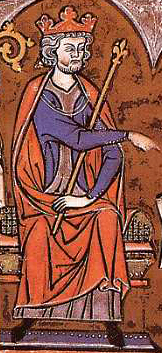
James I the Conqueror was King of Aragon, Count of Barcelona, and Lord of Montpellier from 1213 to 1276; King of Majorca from 1231 to 1276; and King of Valencia from 1238 to 1276. His long reign of 62 years is not only the longest of any Iberian monarch, but one of the longest monarchical reigns in history, ahead of Hirohito but remaining behind Queen Elizabeth II, Queen Victoria, and Ferdinand III of Naples and Sicily.
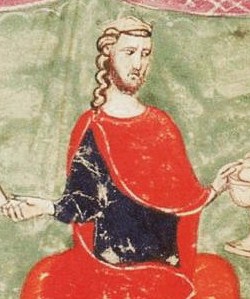
Peter III of Aragon was King of Aragon, King of Valencia, and Count of Barcelona from 1276 to his death. At the invitation of some rebels, he conquered the Kingdom of Sicily and became King of Sicily in 1282, pressing the claim of his wife, Constance II of Sicily, uniting the kingdom to the crown.
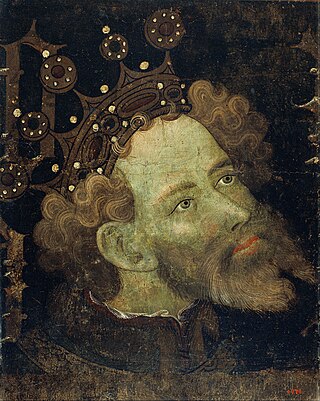
Peter IV, called the Ceremonious, was from 1336 until his death the king of Aragon, Sardinia-Corsica, and Valencia, and count of Barcelona. In 1344, he deposed James III of Majorca and made himself King of Majorca.
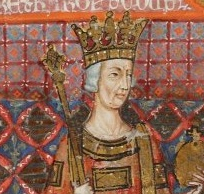
Charles II, also known as Charles the Lame, was King of Naples, Count of Provence and Forcalquier (1285–1309), Prince of Achaea (1285–1289), and Count of Anjou and Maine (1285–1290); he also was King of Albania (1285–1294), and claimed the Kingdom of Jerusalem from 1285. He was the son of Charles I of Anjou—one of the most powerful European monarchs in the second half of the 13th century—and Beatrice of Provence. His father granted Charles the Principality of Salerno in the Kingdom of Sicily in 1272 and made him regent in Provence and Forcalquier in 1279.

James II, called the Just, was the King of Aragon and Valencia and Count of Barcelona from 1291 to 1327. He was also the King of Sicily from 1285 to 1295 and the King of Majorca from 1291 to 1298. From 1297 he was nominally the King of Sardinia and Corsica, but he only acquired the island of Sardinia by conquest in 1324. His full title for the last three decades of his reign was "James, by the grace of God, king of Aragon, Valencia, Sardinia and Corsica, and count of Barcelona".

James II was King of Majorca and Lord of Montpellier from 1276 until his death. He was the second son of James I of Aragon and his wife, Violant, daughter of Andrew II of Hungary. In 1279, by the Treaty of Perpignan, he became a vassal of the Crown of Aragon.
James III, known as James the Rash, was King of Majorca from 1324 to 1344. He was the son of Ferdinand of Majorca and Isabella of Sabran.

Don Juan Manuel was a Spanish medieval writer, nephew of Alfonso X of Castile, son of Manuel of Castile and Beatrice of Savoy. He inherited from his father the great Lordship of Villena, receiving the titles of Lord, Duke and lastly Prince of Villena. He married three times, choosing his wives for political and economic convenience, and worked to match his children with partners associated with royalty. Juan Manuel became one of the richest and most powerful men of his time, coining his own currency as the kings did. During his life, he was criticised for choosing literature as his vocation, an activity thought inferior for a nobleman of such prestige.

James IV of Majorca, also known as Jaume IV, unsuccessfully claimed the thrones of the Kingdom of Majorca and the Principality of Achaea from 1349 until his death. He was also king consort of Naples, without any role in its government.
Isabella of Majorca (1337–1406) was the titular Queen of Majorca and Countess of Roussillon and Cerdanya from 1375 to her death. She was the last titular monarch of Majorca.

Constance II was Queen of Sicily from September 1282 to November 1285 alongside her husband, King Peter I. She was also Queen of Aragon from 1276 to 1285 during her husband's reign as Peter III of Aragon. She was a pretender to the Kingdom of Sicily from 1268 to 1282. She was the only daughter of Manfred, King of Sicily, and his first wife, Beatrice of Savoy.
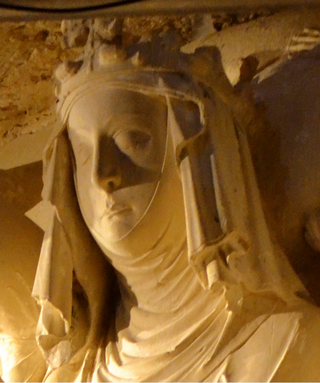
Blanche of Anjou was Queen of Aragon as the second spouse of King James II of Aragon. She was a member of the Capetian House of Anjou, she is also known as Blanche of Naples. She served as Regent or "Queen-Lieutenant" of Aragon during the absence of her spouse in 1310.
Constance of Aragon was an Aragonese infanta who was by marriage firstly Queen of Hungary, and secondly Queen of Germany and Sicily and Holy Roman Empress. She was regent of Sicily from 1212 to 1220.
Eleanor of Sicily (1325–1375) was Queen of Aragon from 1349 until 1375 as the third wife of King Peter IV.
Constance of Aragon (1239–1269) was a daughter of James I of Aragon and his second wife Yolanda of Hungary. She was a member of the House of Barcelona and was Infanta of Castile by her marriage to Manuel of Castile.
Isabella of Aragon may refer to:
Constance of Aragon was Queen of Majorca as the wife of King James III. She was the eldest daughter of Alfonso IV of Aragon and his first wife, Teresa d'Entença.
Constance of Aragon was an Aragonese princess by birth and the princess of Villena by marriage. She was the daughter of King James II of Aragon and his second wife Blanche of Anjou, a Neapolitan princess. She was also the maternal grandmother of King Ferdinand I of Portugal through her daughter Constance.